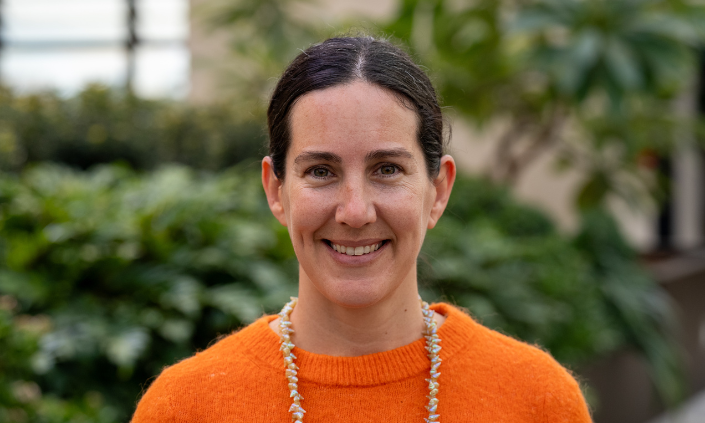Indigenous perspectives in research practices
Dr Lauren Tynan is encouraging researchers and students to centre Indigenous knowledges and pedagogies using the Kin and Country Framework.

The Kin and Country Framework, co-developed with Dr Michelle Bishop from UNSW, uses Eagle, Ant, Grandmother and Granddaughter as Entities and more-than-human perspectives to inspire students and teachers to think about their research, concepts and ideas in different, non-human-centric ways.
- Eagle represents the macro perspective and teaches to see beyond immediate locations and contexts.
- Ant represents the micro perspective and focuses on the local, grassroots context. It is cooperative and exists in interdependent relationships.
- Grandmother facilitates deeper thinking across and between past, present and future and the need to listen with respect.
- Granddaughter understands the values, priorities and actions of today inform and shape tomorrow.

In their latest book chapter, published in Indigenous Research Knowledges and Their Place in the Academy, Drs Tynan and Bishop note that there was very little literature on decolonising and relational approaches to data analysis. They explore how the framework can be applied to data analysis, drawing on the Entities to decentre the individual human researcher and invite multiple perspectives into the analysis of data.
“Decolonising the research process makes space for multiple ways of knowing,” says Dr Tynan.
“Our purpose is to find respectful ways of analysing data, layer the stories and knowledges shared with us, and re-present this to benefit the communities we are working with.”
The chapter suggests that the data analysis framework is best understood through the lens of ‘pattern thinking’ – a holistic approach that emphasises interconnectedness and views past, present and future as unified rather than isolated variables.
Dr Tynan has developed a detailed sequence of respectfully applying the Kin and Country Framework to the data analysis process.

The first steps of the sequence encourage researchers to adapt the Framework to their own context. They ask researchers to familiarise themselves with the Entities and change them to suit their own cultural knowledges or the place they are working. In their previous ‘Finding perspective through our more-than-human kin’ chapter, they consider the Entity of Ant and suggest, “For example, on Dharug Country, what might the perspective of Black Snapper Fish teach us about the waterways and lessons from below the surface?"
Dr Tynan explains that the ‘Find’ and ‘Look’ steps are the heart of the decolonising approach.
“We invite researchers to find the lessons, themes or ‘a-ha’ moments in their data and what jumped out to them. Then, we decentre that human-centric analysis of the data by ‘Looking’ at the key lessons through Eagle, Ant, Grandmother and Granddaughter perspectives.”
An excerpt from Dr Tynan’s sequence to applying the Kin and Country Framework to data analysis:
Find the lessons, themes, a-ha and ‘a Something’ moments
- You may have experienced “a-ha” moments or key concepts that stood out to you when you were conducting interviews, reviewing transcriptions, listening to audio recordings, or working with any other data. Perhaps you already have rough notes or a concise list of concepts, themes, ideas, or words that caught your attention.
- If you haven’t done this yet, take a moment to revisit the data and note any key ideas that emerge.
Look through the Entities
- It’s time to think beyond yourself and your human-centric researcher position.
- Using the Kin and Country Framework, shift away from your own perspective and embrace other perspectives to deepen your data analysis. Take the knowledge (data) shared with you, the key ideas identified (human-centric) and look at them through the lens of the Entities.
- The initial list of themes and concepts reflected your understanding of the data; now, explore it through the Entities to find other perspectives and ways of thinking.
Apply pattern thinking
- This is the stage where we bring the Entities into dialogue, forming kin-pairs and looking critically and holistically at what is being said, what remains unspoken, and what’s not able to be shared.
- This shifts the focus from individual experience to collective, and sometimes global, experiences.
- You might begin with a kin-pair, such as Eagle and Ant (representing the macro and micro) and then move to Grandmother and Granddaughter (past and future).
‘Decolonizing data analysis: A relational approach through the Kin and Country Framework’ builds on Drs Tynan and Bishop’s earlier work on 'Decolonizing the literature review: a relational approach', which is now used as an assessment task and set reading at universities around the world.
“It has been wonderful to see the growing interest and uptake of our work by international scholars, especially graduate students,” says Dr Tynan.
“It is being used as the basis of an assessment task at the University of Guelph in Canada, and by Professor Shawn Wilson, a global authority on Indigenous Studies, in his course at the University of British Columbia. We hope it continues to be a useful and impactful resource for educators and students.”
The Kin and Country Framework is the basis of Dr Tynan’s 2025 First Nations Fellowship with the Australian Centre for Student Equity and Success (ACSES), where it will be expanded with teaching resources and a website in an aim to address inadequate Indigenous perspectives and pedagogies in higher education teaching and learning.
ACSES is a national leader in a future-oriented, evidence-based approach to student equity, leading universities towards accessibility and success for every student.